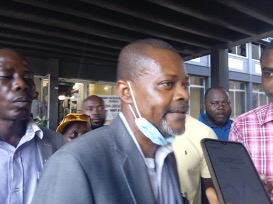Dillions Seeks Mercy At Supreme Court
By: R. Joyclyn Wea
MONROVIA-Montserrado County Senator, Abraham Darius Dillon has taken a back on Judge J. Kennedy Peabody’s April 13, 2022 judgment and has taken a flight at the nation’s highest court for redress.
Senator Dillon filed a petition to Justice Yusiff D. Kaba Chamber Justice of the Supreme Court Monday, January 24, 2023. The petition sought to overturn the April 13 2022 ruling of the lower court in favor Liberty Party Chairman Musa H. Bility.
Judge Peabody of the Civil Law Court at the Temple of Justice at the time denied Senator Dillon’s motion to quash the action filed against him by Musa Bility, but suffered a setback.
Dillon was being prosecuted for Action of Damages for Wrong for Libel and Slander by Attachment,” filed by Musa Bility as a result of Dillon allegedly referring to him as a criminal.
The senator’s legal team at the time filed a motion to quash the lawsuit against him, on grounds that it undermines the function of members of the National Legislature.
Senator Dillon stated in his motion that Article 42(a) of 1986 Constitution of Liberia provided that members of parliament are exempt from arrest when attending, going to, and returning from sessions of the Legislature. This applies except for treason and felony or breach of law.
Citing Section 31 of the Legislative Law, the movant also said: “no judge or Magistrate or Justice of the peace or officer who administers the law shall issue or cause to be issued any writ of attachment or another legal precept against any member of the legislature or the member of his family living in his household or his servant or clearest staff during the session, except for treason, felony or breach of the peace.”
In its ruling, it was noted that even though the Constitution does not require that Legislators be held for slander, libel, or arrest, Article 42 and the history surrounding inclusion of the Immunity Clause both state that members of the Legislature can be exempted from prosecution if they are performing their legislative duty.
According to the court the only way that the legislature can benefit from the Immunity Clause, is if the accusation falls within the scope his legislative duty.
“The framers of the constitution would not have given a blanket immunity to the Legislature, that is to say, for a legislature, his staff and family members to commit private wrong to a citizen and go with impunity,” Judge Peabody noted in his ruling.
Accordingly, even though the Immunity clause prohibits action against legislatures performing legislative functions, it does not prevent action against a legislature that commits tort to go with impunity behind the construction and the act which governs the Legislature.
Source: New republic liberia
